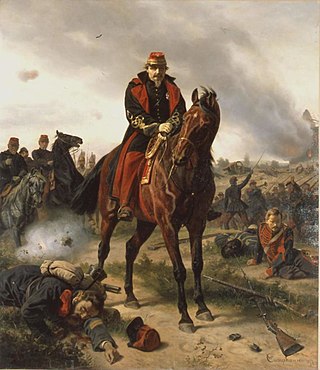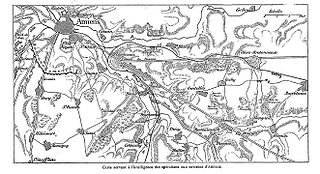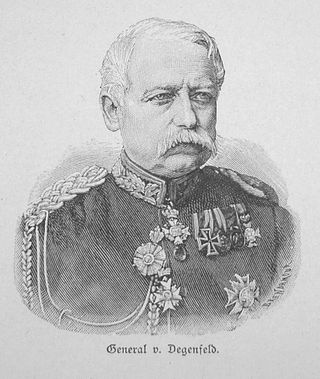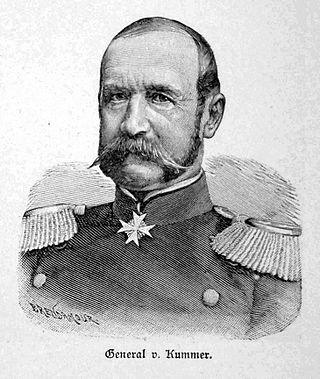
The Battle of Sedan was fought during the Franco-Prussian War from 1 to 2 September 1870. Resulting in the capture of Emperor Napoleon III and over a hundred thousand troops, it effectively decided the war in favour of Prussia and its allies, though fighting continued under a new French government.

The Battle of Wissembourg or Battle of Weissenburg, the first of the Franco-Prussian War, was joined when three German army corps surprised the small French garrison at Wissembourg on 4 August 1870. The defenders, greatly outnumbered, fought stubbornly "especially considering they were surprised and greatly outnumbered, that the French sustained their old renown as fighting men and that the first defeat, although severe, reflected no discredit on the soldiers of the 1st Corps." The fall of Wissembourg allowed the Prussian army to move into France and compelled Marshal Patrice MacMahon to give battle, and suffer defeat, at the Battle of Wörth on 6 August.

Gaston Alexandre Auguste, Marquis de Galliffet, Prince de Martigues, was a French general, best known for having taken part in the repression of the 1871 Paris Commune. He was Minister of War in Waldeck-Rousseau's cabinet at the turn of the century, which caused a controversy in the socialist movement, since independent socialist Alexandre Millerand also took part in the same government, and was thus side by side with the Fusilleur de la Commune.

The Battle of Amiens, also known as the Battle of Villers-Bretonneux, was fought on 27 November 1870 between French and Prussian forces during the Franco-Prussian War (1870–1871). It ended in a Prussian victory, forcing the French to retreat and allowing the Prussians to capture Amiens, France.

Henri Jules Bataille was a nineteenth-century French soldier. He rose to général de division of infantry, saw colonial service in Algeria, and fought in the Second Italian War of Independence and the Franco-Prussian War. He was awarded the Grand Cross of the Legion of Honour.

Eduard Friedrich Karl von Fransecky was Prussian general who served in the Austro-Prussian War and the Franco-Prussian War.

Jakob Freiherr von Hartmann was a Bavarian general who served in the Austro-Prussian War and Franco-Prussian War.

The Army of Châlons was a French military formation that fought during the Franco-Prussian War of 1870. Formed in the camp of Châlons on August 17, 1870, from elements of the Army of the Rhine which the formation was issued from, the Army of Châlons was engaged in combats of Beaumont and Sedan while disappearing during the capitulation of September 2, 1870.

The (First) Battle of Buzenval was part of the siege of Paris during the Franco-Prussian War. The besieged troops in Paris, under the orders of General Louis Trochu, made a sortie in the direction of Versailles.
The Battle of Châtillon, also known as the Battle of Châtillon-sous-Bagneux, was a skirmish in the Siege of Paris between France and North German Confederation in the Franco-Prussian War, took place on 13 October 1870. This is also considered the first battle in the history of the French Third Republic. In this fierce battle – occurred at Châtillon and Sceaux, Corps V of the Prussian army under the command of Lieutenant General Infantry Hugo von Kirchbach, along with the II Corps of the Kingdom of Bavaria by the Supreme Minister infantry Jakob von Hartmann which were the forces of the army Group 3 of Prussia by Prince Friedrich Wilhelm as General command., won a victory against an attack by the XIV Corps under General Renault - of the French army under General Auguste-Alexandre Ducrot. Although some soldiers under Ducrot fought well, the majority of his army became agitated. The French were forced to flee to Paris, losing the Châtillon Plateau - a very favorable defensive position overlooking the fortresses south of Paris - to the Germans. This was a disaster for the "justice" of the French army during the war, although the French reported that they suffered only minor losses.
Joseph Faron was a French general. He came from a working-class background and did not complete his secondary education. He served with distinction in Senegal, was interim Governor of French Cochinchina in 1869–70, and played important roles in the two sieges of Paris during and after the Franco-Prussian War.

Jean-Jacques Alexis Uhrich, was a French général de division. He was the great uncle of Général d'armée Maurice Gamelin (1872–1958). Military governor of the city of Strasbourg in 1870, Uhrich is best known for his service during the Franco-Prussian War (1870–1871) as the commander of French forces during the Siege of Strasbourg and for surrendering the city to German forces.
Alphonse-Théodore Lecointe was a French general and politician.

Angel Laurent Giovaninelli, born on 15 September 1837 in Pastoreccia-di-Rostino in Corsica; died on 28 August 1903 in Frénois (Meuse), was a major general of the French army.
The Battle of Chateauneuf-en-Thimerais was a battle of the Franco-Prussian War, which took place on November 18, 1870, in the commune of Châteauneuf-en-Thymerais in France. This was one of a series of victories by a division of the Prussian army along the Loire under the command of Frederick Francis II, Grand Duke of Mecklenburg-Schwerin before the Garde Mobile's forces fledgling by commander Minister Fiereck, within a week after the Imperial German Army was defeated at the Battle of Coulmiers. During the Battle of Châteauneuf-en-Thimerais, the 22nd Division of the Kingdom of Prussia – noted as a brave division – was under the command of General Friedrich Wilhelm Ludwig von Wittich who captured the commune, taking in his hands hundreds of French prisoners of war. The failure at this battle forced the French forces to retreat westward.
The Battle of Ladon and Mézières was fought at Ladon and Mézières-en-Gâtinais between the French Army of the Loire led by Louis d'Aurelle de Paladines and Imperial German Army led by Prince Friedrich Karl of Prussia on November 17, 1870. During the battle the Prussians forced the French forces to retreat into the Bellegarde woods. Although the French army was quickly defeated in this battle, it showed the Prussians the substantial size of the French XX corps. the engagement showed the Germans that substantial forces of the French XX Corps were present on the battlefield. The defeat caused great damage to French morale. On November 17 the French attacked the Prussians again at the Battle of Beaune-la-Rolande, but they were defeated again.
The Battle of Châteauneuf was a battle in the Franco-Prussian War that took place on December 3, 1870, at the Châteauneuf, Côte-d'Or, France. During this engagement, the 3rd Infantry Brigade of the Prussian army, which was a part of the Baden Division and was under the command of General Keller repelled an ambush of the French army under the command of General Camille Crémer. The battle facilitated the Prussian army to continue its withdrawal from Autun. The battle lasted for seven hours, and brought the Prussian army negligible losses, with 153 casualties. However, the Germans viewed this engagement as one of their most glorious victories of the campaign.

The Battle of Longeau, was a battle of the Franco-Prussian War on 16 December 1870 in Longeau-Percey, near Dijon, France. The fighting lasted about three hours, and ended in a French retreat. Victory went to the Prussian Infantry Brigade under Colmar Freiherr von der Goltz and the German XIV Corps infantry under the command of Lieutenant General August von Werder, over French troops commanded by General Pierre Arbellot de Vacqueur, semt from Langres to Longeau. The French suffered significant losses of both manpower and equipment.

Alfred Emil Ludwig Philipp Freiherr von Degenfeld (1816-1888) was a Badensian-Prussian general and a member of the Reichstag.

Rudolf Ferdinand von Kummer (1816-1900) was a Prussian general who participated in the Austro-Prussian and Franco-Prussian wars.














